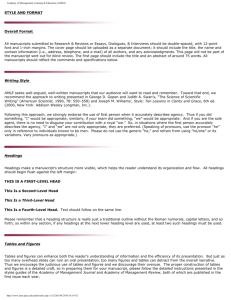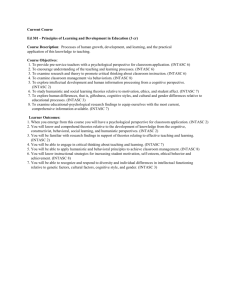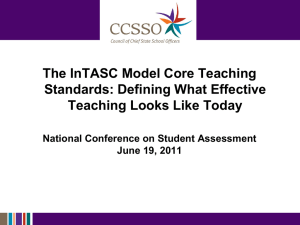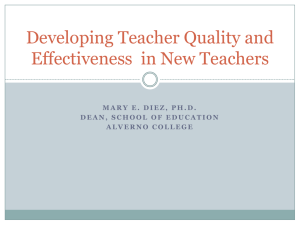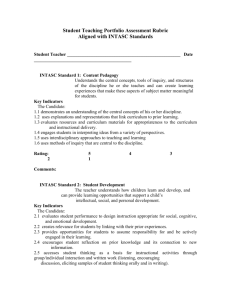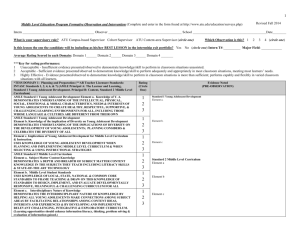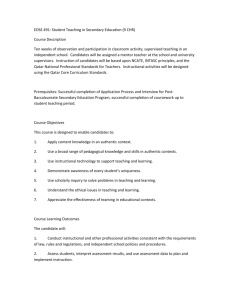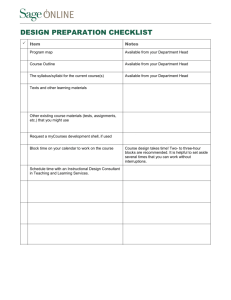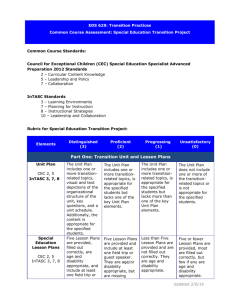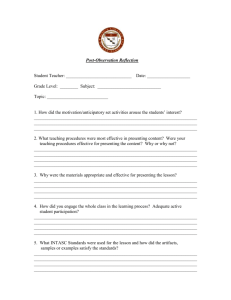EPY 8473 Assessment and Evaluation
advertisement
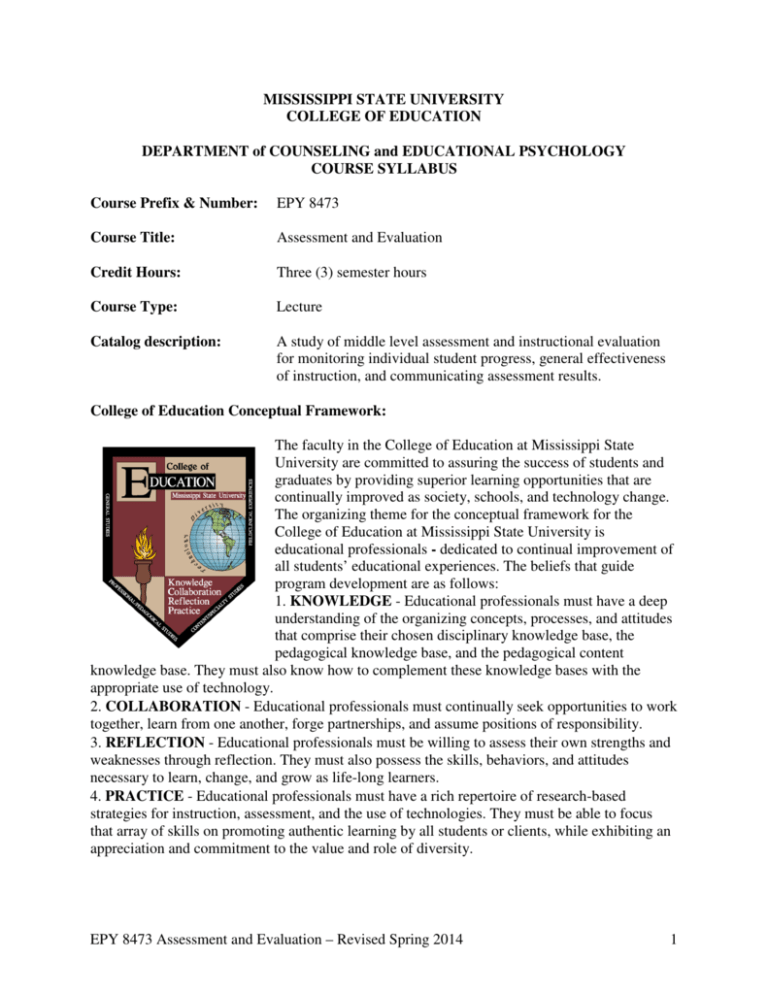
MISSISSIPPI STATE UNIVERSITY COLLEGE OF EDUCATION DEPARTMENT of COUNSELING and EDUCATIONAL PSYCHOLOGY COURSE SYLLABUS Course Prefix & Number: EPY 8473 Course Title: Assessment and Evaluation Credit Hours: Three (3) semester hours Course Type: Lecture Catalog description: A study of middle level assessment and instructional evaluation for monitoring individual student progress, general effectiveness of instruction, and communicating assessment results. College of Education Conceptual Framework: The faculty in the College of Education at Mississippi State University are committed to assuring the success of students and graduates by providing superior learning opportunities that are continually improved as society, schools, and technology change. The organizing theme for the conceptual framework for the College of Education at Mississippi State University is educational professionals - dedicated to continual improvement of all students’ educational experiences. The beliefs that guide program development are as follows: 1. KNOWLEDGE - Educational professionals must have a deep understanding of the organizing concepts, processes, and attitudes that comprise their chosen disciplinary knowledge base, the pedagogical knowledge base, and the pedagogical content knowledge base. They must also know how to complement these knowledge bases with the appropriate use of technology. 2. COLLABORATION - Educational professionals must continually seek opportunities to work together, learn from one another, forge partnerships, and assume positions of responsibility. 3. REFLECTION - Educational professionals must be willing to assess their own strengths and weaknesses through reflection. They must also possess the skills, behaviors, and attitudes necessary to learn, change, and grow as life-long learners. 4. PRACTICE - Educational professionals must have a rich repertoire of research-based strategies for instruction, assessment, and the use of technologies. They must be able to focus that array of skills on promoting authentic learning by all students or clients, while exhibiting an appreciation and commitment to the value and role of diversity. EPY 8473 Assessment and Evaluation – Revised Spring 2014 1 Counseling Programs Mission Statement: The mission of the counseling programs is the development of students who can practice in a variety of professional settings including K-12 schools, institutions of higher education, clinical mental health settings, college counseling centers, and rehabilitation counseling settings. The faculty is committed to preparing graduate students who have solid theoretical knowledge, appropriate clinical skills, and an understanding of the scientist-practitioner model of working with individuals. Graduates are expected to contribute substantially to the improvement of the lives of individuals in our changing, technologically complex, and increasingly diverse society and to promote and conduct research designed to improve and advance the counseling profession. Course Objectives: 1. Utilize the Standards for Teacher Competence in Educational Assessment of Students developed by the American Federation of Teachers, the National Council on Measurement in Education, and the National Education Association, to reflect on his/her own level of competence and self-assess the need for professional development in the areas of planning for, designing, administering, analyzing and interpreting appropriate middle level assessment instruments and procedures. INTASC 8, 9; CFPO 1, 4; AMLE 4c. 2. Read, reflect upon, and discuss the accountability movement in testing including relevant laws and implications of high stakes testing in the middle level, and distinguish among the terms assessment, test, measurement and evaluation. INTASC 7, 8; CFPO 3, 4, 8, 14; AMLE 4 3. Relate the types of assessment and evaluation to various types of instructional decisions and to the middle level planning and instructional process. INTASC 7, 8; CFPO 4, 8; AMLE 3a, 3b. 4. Plan middle level assessment design elements that will align with state standards and the Common Core State Standards. INTASC 7, 8; CFPO 1, 3, 4; AMLE 4. 5. Distinguish between norm and criterion referenced test interpretation. INTASC 7, 8; CFPO 3, 4; AMLE 4. 6. Explore reliability and validity and discuss ways that educators can enhance these essential test qualities. INTASC 7, 8; CFPO 3, 4; AMLE 4. 7. Review and select developmentally appropriate information gathering instruments to make effective classroom evaluations. INTASC 8, 9, 10; CFPO 1, 4; AMLE 1, 4. 8. Write clear, understandable instructional objectives at a variety of capability levels of Bloom, Gagne, or DOK taxonomies for a given assessment. INTASC 7, 8; CFPO 1, 3, 4, 7, 12; AMLE 1, 3, 4. EPY 8473 Assessment and Evaluation – Revised Spring 2014 2 9. Evaluate existing teacher-made tests and quizzes for appropriateness and quality. INTASC 8; CFPO 3, 4; AMLE 1, 3, 4. 10. Develop appropriate checklists, rating scales, observation guides, or rubrics for evaluating middle grade student performances and products (projects, presentations, lab experiments, art pieces). INTASC 8; CFPO 3, 4; AMLE 1, 3, 4. 11. Distinguish among the various types of grading and marking systems in terms of advantages and disadvantages. Demonstrate ability to calculate end of period grades. INTASC 8, 9; CFPO 1, 3, 4; AMLE 1, 4. 12. Interpret results derived from standardized tests for students, parents, and other constituencies. INTASC 8; CFPO 4, 5, 9; AMLE 4, 5. 13. Describe the characteristics of authentic or portfolio assessment systems. INTASC 8; CFPO 3, 4; AMLE 4. 14. Effectively plan for and make decisions related to instructional and assessment accommodations necessary because of student exceptionality or diversity. INTASC 3, 7, 8; CFPO 2, 4, 14; AMLE 1, 3, 4, 5. Topics to Be Covered: (42 contact hours) 1. Basic testing terminology (3) 2. Types of Evaluation (preliminary, diagnostic, formative, summative, norm referenced, criterion referenced) (2) 3. Systematic procedures: checklists, rating scales, rubrics, observation guides (2) 4. Formal and informal assessments (2) 5. Planning for assessment: planning-instruction-assessment cycle (9) 6. Developmentally appropriate assessment issues and testing accommodations (3) 7. Using the table of specifications to plan and write objectives (Bloom’s and DOK) (3) 8. Validity, reliability, and bias (4) 9. Item planning and writing (6) 10. Alignment with state standards and Common Core (3) 11. Grading and marking systems, electronic grading and reporting systems (1) 12. Interpreting results of tests for students and parents, parent-teacher conference practice (1) 13. RTI (1) 14. Accountability movement and high stakes testing, codes of ethical and professional responsibilities (2) Student Activities: Student activities consist of the following: viewing on-line presentations, reading assignments in the text and in other supplemental material supplied by the instructor, use of the EPY 8473 Assessment and Evaluation – Revised Spring 2014 3 Internet to access assessment and instructional materials and reviews, on-line discussion, and participation in selected exercises and assessments. Method of Instruction: The primary method of instruction will be on-line lecture by way of PowerPoint presentations. There are 13 modules in the course (roughly one per week), each consisting of a reading assignment, a PowerPoint presentation, and a variety of assessments to check for understanding and application. Course Requirements: 1. Turn all materials in through myCourses word processed, double spaced and proofread. I prefer Times New Roman, 12-point font. Specific requirements for each assignment will be available in the module packets on myCourses. Use APA style for citations and references. 2. For each module, you are expected to follow the directions posted, in order. Usually, modules will begin with a reading assignment followed by a PowerPoint, which serves in place of a traditional lecture. Upon completion of the reading and PowerPoint, students will be asked to complete the module assignments. Because each module represents a good chunk of time (a reading, followed by the PowerPoint, and then assignments), it is strongly recommended that you allow yourself ample time to complete them. If you wait until Sunday morning to start the week’s module, you won’t be very happy with yourself (or me). 3. Module assignments are due Sundays by midnight. Late submissions will be penalized by 10 points per day of lateness. 4. Students will be divided into 6 groups. Groups will have 4 synchronous chat sessions with me during the course of the semester. These are required, and missing them will affect your grade. Because they’re live chats, it’s impossible to re-create what was discussed, and your absence will impact all the members of your group. 5. I urge groups to communicate often than this by email, in Yahoo Messenger, on the bulletin board in MyCourses, or whatever way works best. Discussing module topics is encouraged—if you don’t understand a concept, perhaps a group member can explain it in a way that makes sense. Just be sure to do your own work on assignments. 6. There will be a midterm and a final exam. These will be open book and open notes, and you will have several days to take the test (although you’ll have a set amount of time to complete the exam once you start). Because you’ll be able to take the test anytime over the course of several days, exams may not be made up. Plan accordingly, and don’t leave the test for the last minute. 7. The major project this semester is one that will require you to write a series of lesson plans. We will discuss this project in more detail as the semester progresses. EPY 8473 Assessment and Evaluation – Revised Spring 2014 4 Honor Code: Students will be expected to abide by the honor code of the university and may be required to sign an honor code statement related to exams and projects for this course. Review the entire honor code at the following website: http://www.honorcode.msstate.edu/pdf/honor-code.pdf Technology/Synchronous Chat Participation Policy: Your participation will definitely affect your grade. If you miss more than 2 scheduled chats, you will probably not complete the class successfully. Please notify the instructor through e-mail within myCourses if you are unable to attend a scheduled chat. About 5 synchronous scheduled chats will be scheduled. Technical Support Information: Technical support is available should you encounter any technological problems while enrolled in this online class. If you need assistance, information is available at the Center for Distance Education (CDE) website at http://www.distance.msstate.edu/#. Click the “Student Resources” tab in the page banner. You can also call tech support at 662.325.8374. If you are unable to resolve your problems through these resources, please contact CDE’s Technology Office at tcraven@aoce.msstate.edu for assistance. Computer/Technology Requirements: 1. Computer with High Speed Internet Access via DSL or equivalent broadband connectivity option (traditional dial-up Internet services do not provide adequate support to the technologies used within the course) 2. Required Browser: Mozilla Firefox (Version 3 or higher); verify that your browser is supported by using the “Check Browser” feature in MyCourses 3. Download the latest version of Adobe Acrobat Reader; this can be downloaded at http://get.adobe.com/reader/otherversions/ 4. Download Adobe Media 5. Download Adobe Flash 6. Download Shockwave Flash 7. Download or upgrade to the latest version of Java 8. Download Quicktime Player; this can be downloaded at http://www.apple.com/quicktime/download/ 9. Download the “Lockdown Browser” in order to complete assessments 10. All pop-up blockers must be turned OFF when using MyCourses 11. To check your Browser, click on “Check Browser” in the top right corner of the course listings page after you log in to MyCourses. You must have a GREEN check on each item listed BEFORE beginning your course. 12. Frequent access to a document scanner. You may need to scan documents and send them to the instructor as a PDF. EPY 8473 Assessment and Evaluation – Revised Spring 2014 5 Communication and Netiquette: We will treat each other with respect and courtesy. The professor has the right to teach just as the students have the right to learn. Online courses are very different than face-to-face classes. Please maintain appropriate netiquette. Diversity: Issues of diversity will be inherent in all discussions and activities completed as a part of this course. Special Accommodations: Notify the instructor privately if you require any special instructional or assessment accommodation because of professionally assessed and documented physical or learning disabilities. Field Component: None Evaluation: Course marks will be assigned on the following scale of possible points. Modules (13 @ 45 points ea.) 585 points Final Exam 100 points Mid-Term Exam 100 points Planning and Assessment Project 115 points Synchronous Chats (4 @ 25 pts ea.) 100 points Total 1000 points The numerical score received will be converted into the corresponding letter grade. Grading scale: A 90 -100% D 60-69% B 80-89% F 59% and below C 70-79% Bibliography: Airasian, P. W. & Russell, M. (2008). Classroom assessment (9th ed.). New York: McGraw-Hill. Amrein, A. L., & Berliner, D. C. (2002). High-stakes testing, uncertainty, and student learning. Education Policy Analysis Archives, 10(18) from http://epaa.asu.edu/epaa/v10n18/. EPY 8473 Assessment and Evaluation – Revised Spring 2014 6 Brookhart, S. M. & Nitko, A. J. (2007). Assessment and grading in the classroom. Upper Saddle River, NJ: Pearson/Merrill Prentice Hall. Haladyna, T.M., Downing, S.M., & Rodriquez, M. C. (2002). A review of multiple choice item writing guidelines for classroom assessment. Applied Measurement in Education, 15, 309-334. Jennings, J., & Rentner, D.S. (2006). Ten big effects of the No Child Left Behind Act on Public Schools. Phi Delta Kappan, 88, 110-113. Kubiszyn, T., & Borich, G. (2011). Educational testing and measurement: Classroom application and practice (9th ed.). New York: John Wiley & Sons. Miller, D. M., Linn, R. L., & Gronlund, N. E. (2009). Measurement and assessment in teaching (10th ed.). Upper Saddle River, NJ: Pearson. Wiggins, G., & McTighe, J. (2006). Understanding by design (2nd ed.). Upper Saddle River, NJ: Prentice-Hall. EPY 8473 Assessment and Evaluation – Revised Spring 2014 7
